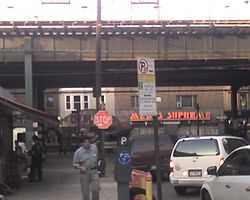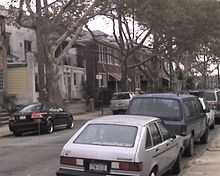Bath Beach, Brooklyn
.jpg)


Bath Beach is a neighborhood in the New York City Borough of Brooklyn in the United States. It is located at the southwestern edge of the borough on Gravesend Bay.
Geography
Sometimes erroneously thought to be part of Bensonhurst, Bath Beach is actually separated from that neighborhood by 86th Street to the northeast. To the north, also across 86th Street, lies New Utrecht. To the northwest across 14th Avenue is Dyker Beach Park and Golf Course, and to the southeast across Stillwell Avenue is the neighborhood of Gravesend. To the south, across Gravesend Bay and Coney Island Creek, are Seagate and Coney Island.
Bath Beach is served by the D service of the New York City Subway system, along the BMT West End Line. Stations along the line serving the community are 18th Avenue, 20th Avenue, Bay Parkway, 25th Avenue, and Bay 50th Street.

Streets of the neighborhood have a unique nomenclature. Four two-way thoroughfares traverse the neighborhood, running southeast/northwest, parallel to Shore Parkway: these are Cropsey Avenue, Bath Avenue, Benson Avenue, and 86th Street. Another, Harway Avenue, runs from Stillwell only as far as Twenty-Fourth Avenue. The one-way northeast/southwest cross-streets are numbered, with the word "Bay" attached (to distinguish them, for postal reasons, from other numbering systems elsewhere in the borough), from Bay 7th Street in the northwest through Bay 50th Street in the southeast. Confusingly for newcomers, every third "Bay" numbered street is replaced with a two-way numbered avenue, from Fourteenth Avenue in the northwest to Twenty-Eighth Avenue in the southeast (except for what would be Twenty-Second Avenue, which is called Bay Parkway). These avenues (as well as 86th Street) are part of the larger grid of avenues and streets encompassing other neighborhoods to the north and west, in the former Towns of Gravesend, New Utrecht, and Brooklyn.
Demographics
Primarily a working class community of semi-attached houses and small apartment houses, Bath Beach is becoming a diverse ethnic community as recent Chinese, Hispanic, Arabic-speaking, and Russian-speaking immigrants displace the native-born Italian-Americans, continuing a cycle (the Italian-Americans' immigrant parents and grandparents displaced native-born German-Americans in the mid-twentieth century). The neighborhood contains a variety of small mom-and-pop businesses intermixed with chain stores, most of which are located at the Caesar's Bay Shopping Center at the terminus of Bay Parkway, as well as on 86th Street.
History
Bath Beach held one of Brooklyn's earliest African-American settlements. Freed slaves were given a parcel of land to settle in the mid-nineteenth century. The church that was once located in the heart of that community, Mount Zion Baptist, has moved to Bedford-Stuyvesant.[1]
The term "Bath Beach" once described the beach resort specifically as part of the community of Bath, New York. Bath and Bath Beach are now more or less synonymous. The population of Bath Beach received a boost at the end of 1863 when steam dummy railroad service connected the community to the City of Brooklyn horsecar system terminal at 25th Street and 5th Avenue in Sunset Park. Bath Beach, named for the English spa, Bath, Somerset, was developed as a recreational seaside retreat for affluent families.[1] It was part of the original Brooklyn town of New Utrecht. Although Coney Island was nearby, Bath Beach had its own amusement park.
Despite its name, the neighborhood no longer has an actual beach.[2] The beach was paved over during the mid-twentieth century to create the Shore Parkway. On the northwestern half, a promenade was constructed to allow residents access to a sea wall. The southwestern half, filled in with land excavated from the construction of the nearby Verrazano-Narrows Bridge during the 1960s, now houses Bensonhust Park,[3] with ballfields and the Caesar's Bay shopping center.
In popular culture
During the 1970s, Bath Beach's commercial strip along 86th Street was used for scenes in the 1971 feature film The French Connection, in the opening credits to the popular television series Welcome Back, Kotter, and most famously in the opening scene of the 1977 feature film Saturday Night Fever. Tony Manero, the lead character (played by John Travolta), walks along the sidewalk, admires shoes in a storefront window, buys two (stacked) slices of pizza through a pizzeria window-counter, and ends up at the hardware store where he works (based on a real hardware store on Fifth Avenue in nearby Bay Ridge).
References
- ↑ 1.0 1.1 Jackson, Kenneth T., and John B. Manbeck. The Neighborhoods of Brooklyn. New York: Citizens Committee for New York City, 1998. ISBN 0300103107
- ↑ Hughes, C.J. (2007-09-09). "A Little Land With a Lot of Sand". The New York Times. Retrieved 2008-03-25.
- ↑ Bensonhust Park Cropsey Avenue between 21 Ave. and Bay Pkwy
Coordinates: 40°36′07″N 74°00′11″W / 40.602°N 74.003°W
